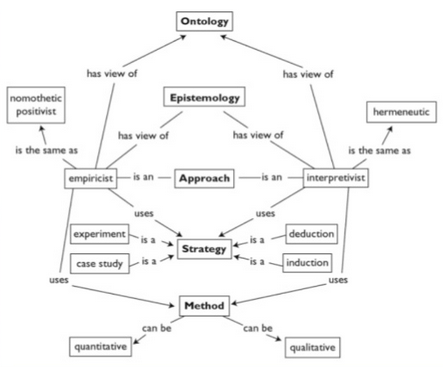Ontology
Ontology and epistemology are two different ways of viewing the research philosophy. Ontology in business research can be defined as “the science or study of being”[1] and it deals with the nature of reality. Ontology is a system of belief that reflects an interpretation of an individual about what constitutes a fact. In simple terms, ontology is associated with what we consider as reality.
Table 1 below illustrates main questions that key philosophical concepts attempt to answer:
| Philosophical concept | Main question |
| Ontology | What is the nature of reality? |
| Epistemology | What can be accepted as knowledge? |
| Methodology | How knowledge regarding given question can be produced? |
| Methods | What specific ways of data collection and data analysis can be used? |
| Paradigm | What are the conceptual and/or methodological models that relate to a specific discipline during a particular period of time? |
Table 1 Key philosophical concepts and questions
Ontology relates to a central question of whether social entities need to be perceived as objective or subjective. In other words, within the scope of your research you need to decide whether the world is external to social world or the perceptions and actions of social actors create social phenomena.[2]
Accordingly, objectivism (or positivism) and subjectivism can be specified as two important aspects of ontology.
Objectivism “portrays the position that social entities exist in reality external to social actors concerned with their existence”[3]. Alternatively, objectivism “is an ontological position that asserts that social phenomena and their meanings have an existence that is independent of social actors”[4].
Subjectivism (also known as constructionism or interpretivism) on the contrary, perceives that social phenomena are created from perceptions and consequent actions of those social actors concerned with their existence. Formally, constructionism can be defined as “ontological position which asserts that social phenomena and their meanings are continually being accomplished by social actors”.[5]
The Table 2 below illustrates the ontology of four major research philosophies related to business studies:
| Research philosophy | Ontology: the researcher’s view of the nature of reality or being |
| Pragmatism | External, multiple, view chosen to best enable answering of research question |
| Positivism | External, objective and independent of social actors |
| Realism | Objective. Exists independently of human thoughts and beliefs or knowledge of their existence (realist), but is interpreted through social conditioning (critical realist) |
| Interpretivism | Socially constructed, subjective, may change, multiple |
Table 2 Ontology of research philosophies
Identification of ontology at the start of the research process is critically important as it determines the choice of the research design. The figure below illustrates the consequent impact of ontology on the choice of research methods via epistemology, research approach, research strategy and methods of data collection and data analysis.
Impact of research philosophy on the choice of research method
Ontology in business studies
You don’t have to discuss ontology in great depth when writing a dissertation in business studies. Several paragraphs to one page will suffice for a dissertation on Bachelor’s or Master’s level, whereas you can devote about two pages to ontology on a research at a PhD level.
You can address ontology part of methodology chapter of your dissertation in the following manner:
Firstly, you can provide a formal definition of ontology with proper referencing. When providing definitions, it is better to use and reference books rather than internet web pages. This can be followed by explanation of ontology in simple terms, in your own words.
Secondly, you have to specify whether you are adopting objectivism or constructivism view. This should be followed by explanation of rationale for your choice by referring to your research aims and objectives.
Thirdly, you have to discuss implications of your ontological choice on the choice of epistemology, research approach, and research strategy and data collection methods.
My e-book, The Ultimate Guide to Writing a Dissertation in Business Studies: a step by step assistance contains discussions of theory and application of research philosophy. The e-book also explains all stages of the research process starting from the selection of the research area to writing personal reflection. Important elements of dissertations such as research philosophy, research approach, research design, methods of data collection and data analysis are explained in this e-book in simple words.
John Dudovskiy
[1] Blaikie, N. (2010) “Designing Social Research” Polity Press
[2] Wilson, J. (2010) “Essentials of Business Research: A Guide to Doing Your Research Project” SAGE
[3] Saunders, M., Lewis, P. & Thornhill, A. (2012) “Research Methods for Business Students” 6th edition, Pearson Education Limited
[4] Bryman, A. (2012) “Social Research Methods” 4th edition, Oxford University Press
[5] Bryman, A. (2012) “Social Research Methods” 4th edition, Oxford University Press


